The Dick Van Dyke Show: The Complete Series Blu-ray Movie
HomeThe Dick Van Dyke Show: The Complete Series Blu-ray Movie 
Image Entertainment | 1961-1965 | 5 Seasons | 3950 min | Rated TV-PG | Nov 13, 2012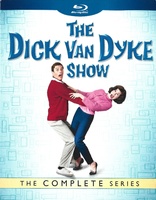
Movie rating
8.6 | / 10 |
Blu-ray rating
| Users | 5.0 | |
| Reviewer | 4.5 | |
| Overall | 4.5 |
Overview
The Dick Van Dyke Show: The Complete Series (1961-1965)
Welcome one of TV's funniest couples ever into your living room. You'll be laughing hysterically as you join Rob Petrie struggling with the ups and downs of work and home, aided and agitated by his lovely wife Laura. Adding to the fun are Rob's wisecracking co-workers Sally and Buddy, long-suffering Mel Cooly and hot-tempered boss Alan Brady.
| Comedy | 100% |
Specifications
Video
Video codec: VC-1
Video resolution: 1080p
Aspect ratio: 1.34:1
Original aspect ratio: 1.33:1
Audio
English: DTS-HD Master Audio Mono
Subtitles
None
Discs
50GB Blu-ray Disc
Fifteen-disc set (15 BDs)
Playback
Region A (locked)
Review
Rating summary
| Movie | 5.0 | |
| Video | 4.5 | |
| Audio | 3.0 | |
| Extras | 4.5 | |
| Overall | 4.5 |
The Dick Van Dyke Show: The Complete Series Blu-ray Movie Review
The Ottoman Empire
Reviewed by Michael Reuben November 21, 2012Whether or not you have ever watched The Dick Van Dyke Show (or "DVDS" for short), you live in a sitcom world that DVDS helped to invent. The show's impact goes beyond mere influence. Its DNA is embedded in today's comedy in much the same way that our ancestors' genes determine our cellular composition. But don't take my word for it. A roster of influential comics, many of them featured in the TV Academy tribute included on this Blu-ray set, can attest to DVDS's influence. Among them are Paul Reiser, who based Mad About You on DVDS, and Ray Romano, who drew on DVDS for inspiration to create Everybody Loves Raymond. No less an authority than Chuck Lorre, co-creator of The Big Bang Theory, Two and a Half Men and Roseanne, has testified to the centrality of DVDS in American comedy. In one of the "vanity cards" appearing at the end of each of his shows, Lorre offered "The Sitcom Writers' Prayer" (no. 285; May 3, 2010):
Lord, if it be thy will, give unto us a story that has lots of comic potential while simultaneously exploring and defining our characters and their relationships (preferably something that hasn't been done on Dick Van Dyke or Friends).The prayer isn't Lorre's only nod to DVDS. He also pays tribute at every opportunity to the prolific TV producer, Sheldon Leonard, who saw the potential in DVDS when everyone, even its creator, Carl Reiner, was ready to abandon it. It was Leonard who pushed the show onto CBS, directed the initial episodes and remained a creative force behind the camera throughout the next five years. If the name "Sheldon Leonard" sounds familiar, it's because Chuck Lorre gave his late boss two namesakes in The Big Bang Theory's physicist roommates, Drs. Sheldon Cooper and Leonard Hofstadter. Like much of the great comedy of the latter 20th Century, DVDS was spawned from the writers' room of Sid Cesar's Your Show of Shows. The same school of laughter that produced Mel Brooks, Woody Allen, Neil Simon and Larry Gelbart also left a young writer named Carl Reiner looking for a job when Cesar's show ended. He quickly penned thirteen scripts for a half-hour sitcom about a family man like himself who worked as a writer on a variety show ruled by a temperamental host. With himself in the leading role, Reiner raised enough money to film a pilot episode under the title Head of the Family—and it bombed. No one wanted it. (Reiner's pilot is included in the extras.) Actor-turned-producer Leonard spotted the problem, which was that Reiner was no good at playing himself. (Leonard's disciple, Chuck Lorre, would later codify this as the "landfill" principle, which holds that, without the right casting, even the best material might as well be landfill.) Leonard told Reiner, you should produce the show, but get someone else to play you. Then Leonard suggested Dick Van Dyke. It may or may not be true, but many people interviewed for the DVD and Blu-ray extras claim that their first reaction upon hearing that name was: What's a "Dick Van Dyke"?
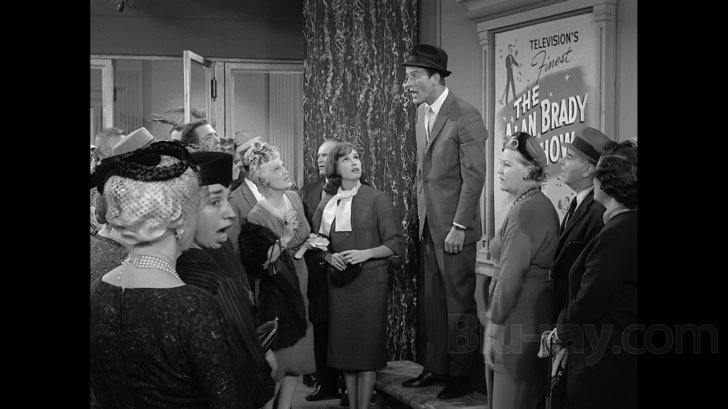
In 1961, when the show that would ultimately bear his name was being developed, Dick Van Dyke was a newly minted star on Broadway in the original production of Bye Bye Birdie. Having auditioned for a small part, Van Dyke was astonished to find himself cast in the lead by veteran director and choreographer Gower Champion, who liked the way Van Dyke moved. Van Dyke protested that he couldn't dance. "We'll teach you", replied Champion, who knew that steps could be learned, but innate physical grace was a gift. Van Dyke went on to win a Tony award for Bye Bye Birdie and star in the 1963 movie. If he had been born in an earlier era, Van Dyke could have joined the ranks of Buster Keaton, Charlie Chaplin or his idol, Stan Laurel. Instead, he grew up watching these great physical clowns of the silent screen and spent hours practicing their moves. Blessed with a string bean body, rubbery features and, as Carl Reiner would later say, apparently no bones to break, Van Dyke had an infinite capacity for taking pratfalls, rearranging his features and performing expressive pantomime. But Van Dyke's gifts weren't limited to gestures; his physical feats were amplified by a dramatic talent that made him an ideal performer for TV. He could tumble over the furniture onto the ground, then lift his head off the floor and exchange dialogue with other actors in the scene—and remain engaged and credible throughout. In Van Dyke, Reiner found the ideal partner with whom to create the character of Rob Petrie, a suburban husband and father who, like other husbands and fathers, got up, got dressed, had breakfast, kissed his wife and son goodbye and went into the city to an office with a desk—except that Rob's desk job wasn't like any other, because Rob wrote comedy. Just under the surface, he was also a performer himself, and throughout the show's first season, the brilliance of Reiner's initial conception became evident as the scripts shifted fluidly between Rob's two identities. The comic looney would often burst out at home, while the strait-laced suburbanite would just as often have to take the stage in the writers' room at work to corral the chaos. (Note that it's primarily in the first season that co-worker Buddy Sorrell ribs Rob about his college education. In later seasons, they behave more as equals.) The theme of dual personalities became explicit in the two-part episode that Reiner wrote for Van Dyke's brother, Jerry, who appeared as Rob's brother, Stacy. In the show, Stacy really did suffer from a split identity manifested through sleepwalking (episodes 26 and 27). When awake, Stacy was shy and retiring; when asleep, he was the life of the party. Rob's own "secret identity" became a delicate subject in episode 22, where Rob had to visit his son's school and explain what he did for a living. His son, Ritchie, was embarrassed, because his dad's job was boring. Sure enough, Rob stumbled before the class, as he tried to explain how to write a comedy sketch. Then he stumbled for real, the kids laughed, and Rob instantly began clowning like a pro (which, in fact, he was). The season's conclusion (episode 30) featured Rob's co-authoring a wild slapstick sketch with the retired writer who gave him his first job. To persuade his co-workers that it was a good idea, he had to perform the whole thing, and by the end you wondered why it was called "The Alan Brady Show" and not "The Rob Petrie Show". (Of course, it really was Rob's show. For the first few seasons, Alan Brady was seen only from behind, though he eventually emerged in full figure in the person of Carl Reiner himself, joyfully out-Cesar-ing Cesar in the department of megalomania. Revenge is a dish best served cold and on national TV.) Though Reiner's concept of a comedy writer's home life provided DVDS's initial inspiration, its longevity resulted from the rich material provided by its ensemble cast, whom Reiner was not shy about tapping for script ideas. The show's single biggest discovery was Mary Tyler Moore, who was a 23-year-old unknown when she was cast as Laura Petrie (pronounced "Laurie" for the show's first season). Previously seen primarily as the legs of the answering service on Richard Diamond, Private Detective, Moore was suggested by Danny Thomas, a co-producer of DVDS, who had almost hired her several years earlier to play his daughter on Make Room for Daddy. (Thomas decided against her, he later said, because no one would believe that a woman with Moore's petite nose could have a father with Thomas' legendary schnoz.) Reiner claims that, as soon as Moore walked into his office and spoke one word, he grabbed her and walked her down to Sheldon Leonard's office, exclaiming, "I found her!" Moore and Van Dyke had instant chemistry. The production code of the era mandated that the Petries sleep in twin beds, but Moore and Van Dyke played a married couple so credibly that much of the public believed they were married. (They were, but not to each other.) Moore was more than a romantic partner, though. She quickly established herself as the most gifted comedienne on TV since Lucille Ball. Van Dyke has said repeatedly that he has never seen anyone pick up comic timing so quickly. In Moore's hands, Laura Petrie became an unexpectedly multi-dimensional character who was every bit her husband's equal in all aspects of their marriage, both good and bad. She could be just as devious, just as needy, just as foolish and, when necessary, just as resourceful and intelligent.

The Dick Van Dyke Show: The Complete Series Blu-ray Movie, Video Quality 
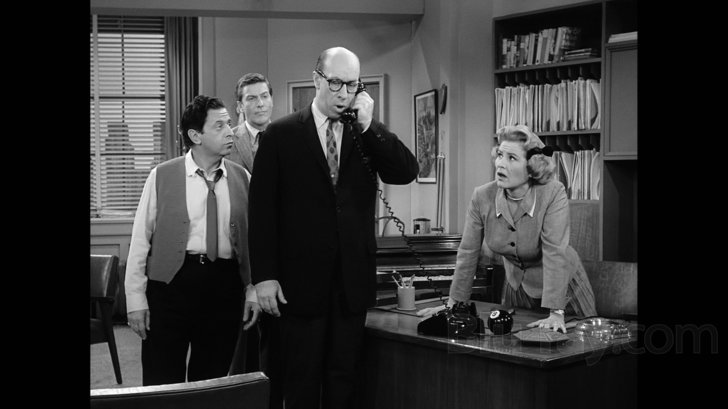
When The Dick Van Dyke Show was first announced for Blu-ray, some questioned whether a black-and-white television show from the 1960s would reveal anything new in high definition. The screenshots accompanying this review should answer the question, but there's additional explanation. DVDS was shot on 35mm film, and the cinematographer for all five seasons was Robert De Grasse, A.S.C., who had been shooting films in Hollywood since the days of silents. De Grasse's feature film credits included Stage Door with Katherine Hepburn, The Bachelor and the Bobbysoxer with Cary Grant and Shirley Temple, and The Miracle of the Bells with Fred MacMurray and Frank Sinatra. By the 1950s, De Grasse had made the switch to TV, where he worked on such programs as Amos 'n' Andy, Our Miss Brooks, I Love Lucy and The Bill Dana Show. The last was a Sheldon Leonard production, which is presumably how De Grasse ended up on DVDS. It turned out to be an ideal match. As the show's producer, Carl Reiner was notorious for his refusal to compromise on quality; the stories are legion throughout the extras on this Blu-ray set. As a cameraman, De Grasse couldn't help but light TV as if it were a feature film, even though the results would be viewed on 19" screens at a fraction of their resolution. (De Grasse would no doubt sympathize with today's cinematographers who see their work being consumed on tiny handhelds.) When he died in 1971, De Grasse couldn't have imagined that he'd miraculously "future-proofed" his work for the day when, fifty years after the fact, an enterprising Blu-ray producer and publisher could finally present it as De Grasse shot it. Based on new scans from the camera negatives, the five seasons of DVDS are presented on fifteen 1080p, VC-1-encoded Blu-rays that are nothing short of spectacular. The source elements have been exceptionally well-preserved, with only minor and occasional damage to betray their age. When the rare flaw does occur, it's a shock, precisely because it is so rare. An example can be found just after time mark 14:00 of episode 14 (Buddy, Can You Spare a Job?), where scratches at the left of the frame make it momentarily appear that a waterfall has suddenly materialized in front of Mary Tyler Moore. (It quickly disappears.) As in the very best theatrical b&w photography, shades of black, gray and white are finely differentiated to create a sense of depth and delineate minute details. Never before, even on Image's otherwise excellent DVD set of DVDS, could one make out the details of the pictures and posters stuck on the writers' room walls at the Alan Brady Show. The wardrobe and hairstyle details can also be seen with precision, and it's fascinating to compare them with those on Mad Men, where the same time period is being recreated, but through a prism of nostalgia. And, of course, the intensely personal, even intimate, comedy of relationships that is an essential element of DVDS plays even more effectively when the tiniest flicker of expression registers with perfect clarity. On occasion, the enhanced resolution isn't the show's friend. Some of the make-up gags were limited by time and money, and they worked then, because the audience at home couldn't see how cheap they were. But we can see it now, and we have to make allowances. A good example is episode 93 (I'd Rather Be Bald Than Have No Head at All), which is still hilarious. Salad, anyone? Video noise is rare and minor, but it does occur, and it's always in the same place: wardrobe. Rob Petrie's clothing in particular favors fine checks and stripes that, in close-up, seem to pose a challenge even for Blu-ray's resolution. At DVD resolution, the noise disappears, along with the details of the patterns. Without examining the source material, it's hard to know for certain, but this appears to be one of those situations where the limitations of 2K resolution are exposed and the (still) superior abilities of 35mm film become apparent. Somewhere, Robert De Grasse is holding his light meter and smiling. As noted, this is a new scan. The difference is obvious in direct comparison to Image's DVD edition, which shows less at the left and right of the frame. To allow readers to compare both the difference in aspect ratios and the improvement in detail, the last two images included under the "Screenshots" tab present the same frame from the Blu-ray and the DVD; the latter has been upconverted to 1080p by the same hardware used to capture the Blu-ray image.
The Dick Van Dyke Show: The Complete Series Blu-ray Movie, Audio Quality 
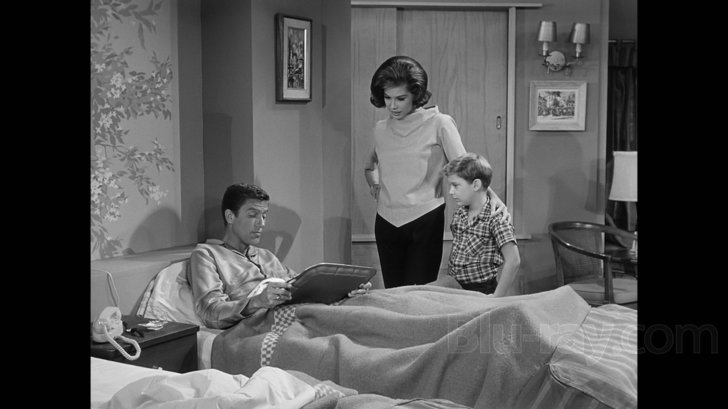
There's not much to say about The Dick Van Dyke Show's DTS-HD MA 1.0 soundtrack, except that it's generally in excellent shape. The mono mix followed (and arguably solidified) a pattern familiar from almost every major sitcom since that time, with voices clearly rendered, simple sound effects, music reserved for fade-in, fade-outs and major transitions and, of course, the laugh track. The dynamic range is somewhat limited, as one would expect from this era of broadcast television, but not so much that the track ever sounds harsh or fatiguing. Most episodes were taped with a studio audience, and post-production ADR is obvious and noticeable when it occurs. That's one of the very few downsides of Blu-ray's increased sonic and visual resolution; during the original broadcasts, small screens, tiny speakers and NTSC resolution successfully hid the seams. Also, on occasion the volume will suddenly drop, then bounce back to its previous level after a second or two; these appear to be flaws in the source material, but they're sufficiently infrequent to be only a minor distraction.
The Dick Van Dyke Show: The Complete Series Blu-ray Movie, Special Features and Extras 
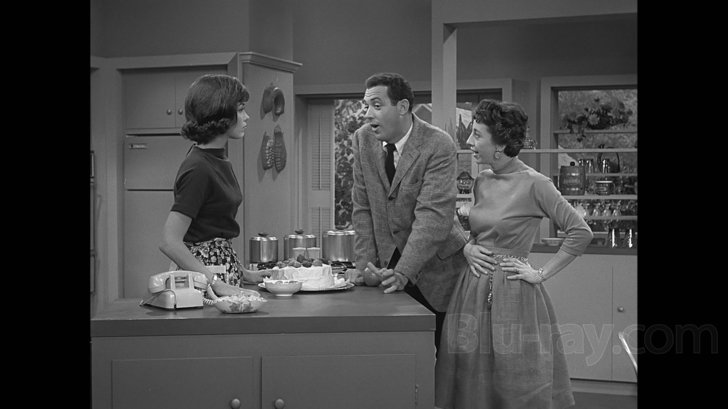
For ease of reference, the extras are listed below in two groups: (1) new extras exclusive to Blu-ray, as listed by the set's producers; and (2) "legacy" extras ported over from the DVD sets previously released by Image in 2003 and 2004. The latter were differently organized on DVD, and I have not attempted to compare them item by item. However, if anyone wants to know whether a particular DVD feature has been included, please check the list below.
-
Blu-ray exclusive features
Season 1
- TV Academy Tribute to Carl Reiner—Paul Reiser (disc 3) (480i; 1.33:1; 10:21): On October 13, 2011, Reiner was honored for lifetime achievement by The Academy of Television Arts and Sciences. Excerpts from the event have been included throughout the Blu-ray set. The quality is standard definition, because the event was shown by webcast. In this section, Paul Reiser describes Reiner's Emmy-winning guest appearance on Mad About You, where he reprised the Alan Brady character.
- 50th Anniversary Q&A (disc 3) (480i; 1.85:1, non-enhanced; 29:14): This, too, appears to be a webcast. It opens with Van Dyke and a group of backing vocalists performing the lyrics written by Morey Amsterdam for Earle Hagen's theme song. Then the star settles into a panel discussion with Reiner and Garry Marshall, who joined the show as a writer in 1964. With Marshall acting as informal moderator, they range broadly over the show's history and take questions from the audience. The best stories are from Reiner about his early days performing Shakespeare. Season 2
- "Kick the Habit" Anti-Smoking PSA Radio Spot Featuring Dick Van Dyke (disc 1) (0:58): This short announcement plays at the start-up of disc 1 over a disclaimer noting that smoking depicted in the show should be considered in historical context. A major sponsor of Season 2 was Lorillard Tobacco, maker of Kent Cigarettes, and the cast performed numerous ads for Kent, which heavily promoted the benefits of its "Micronite" filter. Behind the fancy name was the reality that "Micronite" was made of asbestos.
- It May Look Like a Walnut Color Test (disc 2, episode 51) (480i, 1.33:1, windowboxed; 3:46): This appears to be a colorization trial on a portion of one of the show's most famous episodes. In the 50th Anniversary Q&A listed above, Reiner refers to proposals to colorize the show, which he rejected.
- Safety Council Reel (disc 3) (480i; 1.33:1; 1:47): A series of brief PSAs taped by Dick Van Dyke for the National Safety Council to encourage safe driving. If all PSAs were this entertaining, compact and effective, they'd work better.
- Dick on The Danny Kaye Show (disc 3) (480i; 1.33:1; 16:41): In an extended sketch, Van Dyke plays a less-than-encouraging best man to Kaye's nervous groom. Be sure to watch to the end. Season 3
- Mary on The Danny Kaye Show (disc 3) (480i; 1.33:1; 10:17): Moore joins Kaye for a sitcom parody with sufficient political incorrectness that no one would do it today. The quality of the source material is much poorer than that for the appearance by Dick Van Dyke.
- TV Academy Tribute to Carl—Steve Martin and George Clooney (disc 3) (480i; 1.33:1; 5:58): Martin offers a pre-recorded tribute in his customary facetious style, and Clooney presents the actual award and tells a story of his early job chauffering Rose Marie, Martha Raye and Rosemary Clooney to and from performances. Season 4
- Mary on The Danny Thomas Show (disc 1) (480i; 1.33:1; 2:32): A comic rendition of the (more or less) true story of how Moore came to be cast as Laura Petrie.
- TV Academy Tribute to Carl—Dick Van Dyke (disc 1) (480i; 1.33:1; 11:14): Reiner tells DVDS's origin story one more time, Van Dyke describes how he became involved, and the two of them re-tell stories that will be familiar to anyone who has already listened to the episode commentaries.
- TV Academy Tribute to Carl—Ray Romano and Brad Garrett (disc 1) (480i; 1.33:1; 1:53): A brief, pre-recorded tribute.
- TV Academy Tribute to Carl—Rose Marie, Larry Matthews, Bill Persky (disc 2) (480i; 1.33:1; 13:04): In what may be the best of the TV Academy Tribute segments, writer Bill Persky, who, with his partner Sam Denoff, took over showrunning duties for Reiner during much of season 5, recalls what he learned from his mentor—and Persky is a great storyteller. Season 5
- TV Academy Tribute to Carl—Garry Shandling (disc 1) (480i; 1.33:1; 2:29): In typical Shandling fashion, he never completely articulates a thought. But he gets the point across.
- Me-TV Promo—My Blonde-Haired Brunette (Season 1) (disc 1) (480i; 1.33:1; 0:34): Reiner explains about "crying funny".
- Me-TV Promo—Package 1 (disc 1) (480i; 1.33:1; 1:50): A great collection of memories for fans; an accurate preview for those who want to sample.
- Me-TV Promo—Package 2 (disc 2) (480i; 1.33:1; 2:05): The opening promo, which features Reiner as Alan Brady, past and present, is the best, but they're all enjoyable. (Note: A few additional Me-TV promos are scattered throughout the individual episodes. Although not listed as Blu-ray exclusives, they are new to this set, because Me-TV did not begin broadcasting DVDS until 2010.)
- Commentaries
- Disc 2
- Commentary on Episode 19 (Where Did I Come From?) by Carl Reiner and Dick Van Dyke
- Disc 3
- Commentary on Episode 29 (The Sleeping Brother) by Dick Van Dyke and Carl Reiner
- Episode Photos
- Disc 1: Episodes 1, 2, 3, 4, 5, 6, 10
- Disc 2: Episodes 11, 12
- Disc 3: Episodes 21, 23, 24, 25, 26, 27, 28, 29, 30
- Play with Promo: The following episodes can be played with or without an ad for Cheer laundry detergent:
- Disc 1: Episodes 2, 10, 19, 20
- Disc 2: Episodes 11, 12, 14, 16, 17, 18, 20
- Disc 3: Episodes 21, 22, 23, 24 (also Me-TV promo), 26, 27, 28 (also Dick Van Dyke promo)
- Miscellaneous
- Disc 1
- CBS Promo (aired during Password, January 26, 1962)
- Head of the Family Pilot
- Carl Remembers Pilot
- Carl & Sheldon Remember Pilot
- The Cast Remembers My Blonde-Haired Brunette (episode 9)
- Disc 2
- The Cast Remembers Buddy
- Remembering Where Did I Come From? (episode 19)
- Disc 3
- Carl, Rose and Morey Remember Dick's Physical Comedy
- Emmy Awards® (1961-1962) Outstanding Writing Achievement in Comedy
- Commentaries
- Disc 1
- Commentary on Episode 34 (The Attempted Marriage) by Carl Reiner and Dick Van Dyke
- Commentary on Episode 37 (My Husband Is Not a Drunk) by Carl Reiner and Dick Van Dyke
- Commentary on Episode 41 (A Bird in the Head Hurts) by Rose Marie, Larry Mathews and Ann Morgan Guilbert
- Disc 3
- Commentary on Episode 53 (All About Eavesdropping) by Rose Marie, Larry Mathews and Ann Morgan Guilbert
- Episode Photos
- Disc 1: Episodes 31, 33, 34, 35, 36, 37, 38, 39
- Disc 2: Episodes 42, 43, 44, 45, 46, 47, 48, 49, 50, 51, 52
- Disc 3: Episodes 53, 54, 55, 58, 60, 61, 62, 63
- Play with Promo: The following episodes can be played with or without ads. The most common ad in season 2 was for Kent cigarettes:
- Disc 1: Episodes 31 (also Me-TV), 32 (Dash), 33 (Joy), 34, 35, 36, 37 (Joy), 38 (Joy), 39, 40 (Joy), 41
- Disc 2: Episodes 43, 45, 47, 49, 50
- Disc 3: Episodes 53, 55, 58, 60, 62 (also Family Cavalcade)
- Miscellaneous
- Disc 1
- Remembering the Ottoman
- Remembering Rob and Laura
- Remembering Buddy and Sally
- Emmy Awards® (1962-1963) Outstanding Directorial and Program Achievements in Comedy
- Remembering the Bank Book (episode 33)
- Remembering the Woodpecker (episode 41)
- Disc 2
- Emmy Awards® (1962-1963) Outstanding Writing Achievement in Comedy
- Remembering Dick's Sneezing (episode 42)
- Remembering Jerry Paris (episode 43)
- CBS Promo (episode 51)
- Making It May Look Like a Walnut (episode 51)
- Disc 3
- Remembering "Oh, Rob"
- Commentaries
- Disc 1
- Commentary on Episode 64 (That's My Boy??) by Carl Reiner and Dick Van Dyke
- Disc 3
- Commentary on Episode 90 (October Eve) by Carl Reiner and Dick Van Dyke
- Episode Photos
- Disc 1: Episodes 64, 65, 66, 67, 68, ,70, 71, 72, 73
- Disc 2: Episodes 76, 78, 82
- Disc 3: Episodes 89, 90, 91, 93, 94, 95
- Miscellaneous
- Disc 1
- Remembering Sheldon Leonard
- Sheldon on the Role of Executive Producer
- The Danny Thomas Show (10/21/1963)
- Remembering That's My Boy?? (episode 64)
- Me-TV Promo (episode 64)
- Dick Van Dyke Promo (episode 66)
- Remembering the Betty Lou (episode 72)
- Disc 2
- Rehearsal footage from A Day in the Life of Sheldon Leonard
- The Cast Plays Stump the Stars
- Emmy Awards® (1963-1964) Outstanding Writing and Direcing Achievements in Comedy
- Remembering Joe Coogan (episode 80)
- Me-TV Promo (episode 80)
- Disc 3
- Dick and Mary on Van Dyke & Company
- Emmy Awards® (1963-1964) Outstanding Continued Performance by Actor/Actress in a Series
- Nick at Nite Promos
- Remembering Alan Brady (episode 86)
- Remembering October Eve (episode 90)
- Commentaries
- Disc 3
- Commentary on Episode 121 (Never Bathe on Saturday) by Carl Reiner and Dick Van Dyke
- Commentary on Episode 124 (Baby Fat) by Carl Reiner and Dick Van Dyke
- Commentary on Episode 124 (Baby Fat) by Garry Marshall
- Episode Photos
- Disc 1: Episodes 96, 97, 98, 99, 100, 101, 102, 103, 104, 105, 106
- Disc 2: Episodes 107, 108, 109, 110, 111, 112, 113, 114, 115, 116
- Disc 3: Episodes 118, 119, 120, 121, 122, 123, 125, 126, 127
- Miscellaneous
- Disc 1
- Remembering Don Rickles (episode 102)
- Clip from the Animated Program The Alan Brady Show (episode 103)
- Remembering the Pink Pills (episode 106)
- Disc 2
- DVD Exclusive Awards: The Dick Van Dyke Show: Season One (Best Overall DVD, TV Program)
- Diagnosis Murder: Dr. Mark Sloan Meets Rob Petrie
- Dick Sings the Theme Song at the Hollywood Bowl (2001)
- Disc 3
- The Dick Van Dyke Show Remembered
- Emmy Awards® (1964-1965) Outstanding Program Achievement in Entertainment
- Nick at Nite Promos
- Remembering Never Bathe on Saturday (episode 121)
- Remembering Baby Fat (episode 124)
- Remembering the Motorcyle (episode 125)
- Commentaries
- Disc 1
- Commentary on Episode 128 (Coast-to-Coast Big Mouth) by Carl Reiner and Dick Van Dyke
- Disc 2
- Commentary on Episode 148 (Dear Sally Rogers) by Rose Marie, Larry Matthew and Bill Idelson
- Disc 3
- Commentary on Episode 158 (The Gunslinger) by Carl Reiner and Dick Van Dyke
- Episode Photos
- Disc 1: Episodes 128, 129, 130, 131, 132, 133, 134, 135, 136, 137, 138
- Disc 2: Episodes 139, 140, 141, 142, 143
- Disc 3: Episodes 152, 158
- Miscellaneous
- Disc 1
- Emmy Awards® (1965-1966) Outstanding Comedy Series
- Remembering 4½ and The Alan Brady Show Goes to Jail
- Remembering Coast-to-Coast Big Mouth (episode 128)
- Me-TV Promo (episode 128)
- Disc 2
- Emmy Awards® (1965-1966) Outstanding Continued Performance by an Actor/Actress in a Leading Role in a Comedy Series
- Comic Relief (1992)
- TV Land Awards (2003)
- Nick at Nite Promos
- "Keep Your Fingers Crossed" (theme from The Dick Van Dyke Show) (episode 145)
- Remembering Richard Deacon (episode 146)
- Remembering Sally (episode 148)
- Disc 3
- Dick Van Dyke and the Other Woman: If Men Could Cry
- TV Land Promo for The Dick Van Dyke Show
- Theatrical Trailer: The Art of Love
- The New Dick Van Dyke Show Preview
- Remembering Buddy's Bar Mitzvah (episode 149)
- Remembering The Gunslinger (episode 158)

The Dick Van Dyke Show: The Complete Series Blu-ray Movie, Overall Score and Recommendation 
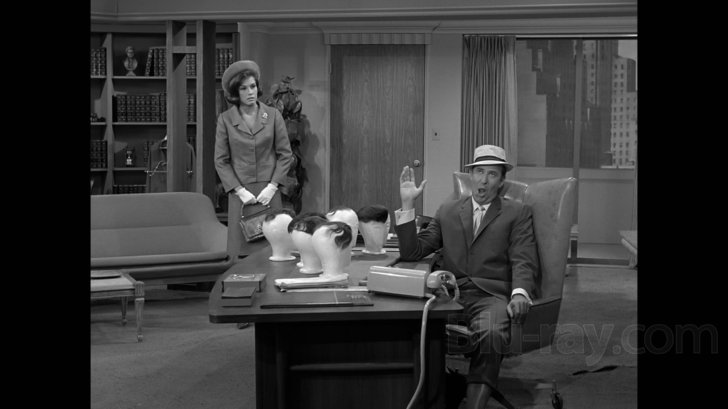
DVDS is frequently and justly remembered for its signature routines and the stars it created, especially Mary Tyler Moore. A less oft-noted influence is its introduction of the workplace into the American sitcom. Sitcoms were born in the home, starting in the apartments occupied by the likes of Molly Goldberg, Lucy Ricardo and Ralph Kramden, and ultimately relocating to the suburban environs of the Andersons, Nelsons and Cleavers. Dad's workplace sometimes figured into the picture, but that was the exception; the rule was that everything revolved around the household and its issues. On DVDS, though, the workplace became an integral element of the show, and sometimes it was even the focus of the "A" storyline. Thus began a trend that would eventually lead to such stalwarts as Taxi, Barney Miller, Cheers and, yes, The Mary Tyler Moore Show. Even today, though, DVDS's peculiar blend of home and workplace can be easily spotted in the very place where producer Chuck Lorre posted his "Sitcom Writers' Prayer". Whenever The Big Bang Theory's gang of physicists sits around a Cal Tech cafeteria table trading quips about their lives, the echo of Carl Reiner's original formula is unmistakable. The writers' prayer has been answered. As for this new Blu-ray presentation of DVDS, the price is steep, but the presentation is excellent, and the show remains one of the best comedies ever broadcast. Even if you decide to wait for a sale, highly recommended.
Other editions
The Dick Van Dyke Show: Other Seasons

The Dick Van Dyke Show: The Complete First Season
1961

The Dick Van Dyke Show - Now in Living Color
1961-1966

The Dick Van Dyke Show: The Complete Second Season
1962-1963

The Dick Van Dyke Show: The Complete Third Season
1963

The Dick Van Dyke Show: The Complete Fourth Season
1964

The Dick Van Dyke Show: The Complete Fifth Season
1965
Similar titles
Similar titles you might also like

Victor/Victoria: The Broadway Musical
1995

Bye Bye Birdie
1963

How to Succeed in Business Without Really Trying
1967

A Funny Thing Happened on the Way to the Forum
1966

Du Barry Was a Lady
Warner Archive Collection
1943

Hair
1979

The Great Race
Warner Archive Collection
1965

Mame
1974

Silent Movie
1976

Thoroughly Modern Millie
1967

Company
Stephen Sondheim's Company
2007

Dance With Me, Henry!
1956

S.O.B.
Warner Archive Collection
1981

Who's Minding the Store?
1963

Chitty Chitty Bang Bang
1968

Neptune's Daughter
Warner Archive Collection
1949

Reefer Madness: The Movie Musical
Slipcover in Original Pressing
2005

In the Navy
1941

Rock of Ages
2012

Anchors Aweigh
1945